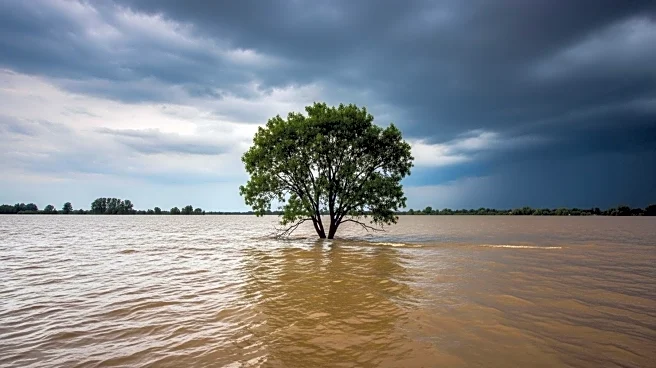What's Happening?
Pakistan's eastern Punjab province is experiencing the largest flood in its history, impacting approximately 2 million residents. The floods have been exacerbated by global warming, which has intensified monsoon rains across the region. The situation has been further complicated by India releasing water from swollen rivers and overflowing dams, leading to cross-border flooding in Pakistan's low-lying areas. The senior minister for Punjab, Maryam Aurangzeb, highlighted the unprecedented water levels in the Sutlej, Chenab, and Ravi rivers. Local authorities are utilizing educational institutions and security facilities as rescue camps, evacuating affected individuals by boat. The Foreign Ministry is investigating India's water release, although India has not commented on the situation.
Why It's Important?
The floods in Punjab have significant implications for Pakistan's agricultural sector, particularly as the province is a major wheat producer. The destruction of crops due to flooding could lead to food shortages, exacerbating economic challenges in a country already vulnerable to climate change impacts. The flooding also highlights the geopolitical tensions between Pakistan and India, as cross-border water management becomes a critical issue. The humanitarian impact is severe, with hundreds of thousands displaced and infrastructure damaged, necessitating substantial relief efforts and international support.
What's Next?
Pakistan's disaster management authority is actively involved in rescue and relief operations, with efforts likely to continue as the monsoon season progresses. The government may seek diplomatic engagement with India to address water management and prevent future flooding incidents. Additionally, there may be calls for international aid to support recovery and rebuilding efforts in the affected regions. Long-term strategies to mitigate climate change impacts and improve infrastructure resilience are expected to be prioritized.
Beyond the Headlines
The floods underscore the urgent need for regional cooperation on climate change adaptation and water resource management. Ethical considerations arise regarding the responsibility of upstream countries in managing water flows that affect downstream neighbors. The situation may also prompt discussions on sustainable agricultural practices and investment in flood-resistant infrastructure to safeguard vulnerable communities.









